EWOSA News - May 2022

- Home
- EWOSA News - May 2022
Welcome to the latest edition of the Energy and Water Ombudsman SA (EWOSA) quarterly newsletter: your one stop shop for emerging consumer trends, hot issues and policy matters.
From the Ombudsman
Notably, complaints about issues relating to payment difficulties and disconnections continue to be at relatively lower levels, in line with the trend highlighted in our Annual Report. In March, we received 36 credit complaints, compared with 61 in March 2021.
We continue to track these complaints for both energy and water, and report to the AER and the Essential Services Commission of South Australia on a regular basis.
As mentioned in our last newsletter, we now talk about “complaints” rather than “cases”. A case is a contact with us, which is classified as either a “complaint” or an “enquiry”.
A complaint is an expression of dissatisfaction with a Member (an energy or water service supplier) regarding a policy, practice or customer service performance. Enquiries are requests for information or assistance from customers about a range of issues. They can be general in nature or about specific topics, such as billing or credit.
I’m also delighted to be able to report on a new publication.
For the past three years we have been working behind the scenes on a series of initiatives with the Thriving Communities Partnership (TCP), which aims to build deeper connections, networks for collaboration and platforms for collective learning and action to unite and shape a system around what works better for people.
This month we launched the TCP Better Practice Guide, which captures emerging insights and case studies of better practice in staff awareness and training to support all members of the community, especially people experiencing vulnerability. Read on to find out more.
We want you to know that we are here to help. Please contact us on 1800 665 565 or via our website if you need assistance.
Sandy Canale
Energy and Water Ombudsman SA
Consumer Trends 1


Hot Topics
The Thriving Communities Partnership (TCP) South Australian Chapter was established in 2019, when around 25 government, business and community organisations in South Australia came together to better support customers in vulnerable circumstances.
A series of workshops culminated in the identification of staff awareness and training as a priority focus area. This in turn led to the creation and release of the TCP Better Practice Guide, which can help any organisation to support anyone in the community, especially people experiencing vulnerability.
It is designed to be used as a reference for key concepts and suggestions that can help to underpin better practice in action and includes case studies of better practice.
Source:
Rooftop solar systems and home batteries are becoming more common, but there are still untapped opportunities to use such technologies to reduce bills, give consumers more control over energy use and maintain a secure and stable grid.
Australia’s Energy Ministers have signed off on reforms that seek to unlock these opportunities, and these are now being implemented by the Energy Security Board through the Distributed Energy Resources Implementation Plan.
An online workshop to synthesise customer insights and opportunities will be held on 25 May 2022 from 9.30am-12.30pm. Stakeholders can register here.
Source:
The Energy Charter has supported the development of a draft National Customer Code for Energy Comparators and Energy Moving Services in collaboration with energy comparators, energy moving services, energy retailers and consumer representatives. Energy & Water Ombudsman SA has been a participant.
The Code is designed to give customers using these channels the confidence that the signatories are working together in their best interests and delivering value to them. The draft Code aims to respond to some of the concerns raised in the Australian Competition and Consumer Commission Retail Electricity Pricing Inquiry Report 2018.
Source:
Consumer Trends 2
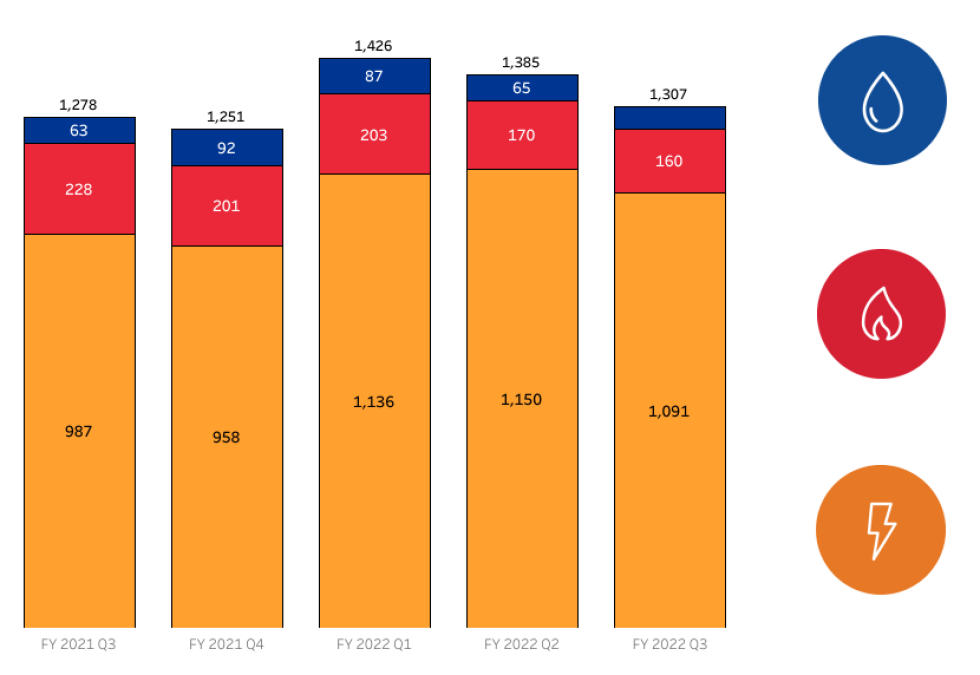

Case Studies
Issues: Billing – Billing Process – Cross Meter/Wrong Meter
Utility: Electricity
Customer Type: Residential
Case Type: Investigation
The Issue:
Mr J received estimated bills from his supplier between April and November 2021, despite having a remotely read smart meter installed at the property. He contacted his supplier about the issue who sent a technician out to investigate.
It was discovered that the meter number on Mr J’s bills did not match the number on the meter installed at his property.
Our Review:
We found the supplier recorded the incorrect meter details when the meter was installed and this issue was corrected. The supplier sent amended bills to Mr J based on the meter data for his meter and backdated this to April 2021.
We reviewed the bills to ensure that the supplier complied with the relevant back billing rules and that the billed data matched the usage recorded by the correct meter.
Resolution:
A $200 goodwill credit was applied to the account and the supplier advised it will also provide a backdated discount offer for the inconvenience caused.
Issues: Land – Property Damage – Reimbursement Claim
Utility: Electricity
Customer Type: Residential
Case Type: Facilitation
The Issue:
Mr L was seeking compensation and the waiving of re-connection charges by the electricity distributor following an outage event at his property.
Our Review:
We found that the fault that caused the outage was on Mr L’s private electrical installation.
When the service fuses on the street pole were replaced, a small fire started in Mr L’s meter box.
This fire was not deemed a result of the replacement of the fuses and more than likely a result of the initial fault on the sub main circuit breaker.
Resolution:
As the distributor was required to attend to re-connect the supply and collect the Certificate of Compliance, the re-connection fee was not waived.
An ex-gratia payment of $450 was provided to Mr L to cover the costs of components and time spent by his electrician working on the meter board.
Consumer Trends 3
Customer Corner
The AER has released a Better Bills Guideline which will lead to major changes to energy bills. Customers will be able to look at their bills and quickly see whether they could get a better deal, and how to switch. A tiered approach to information on the bill will also enable customers to access essential information on the first page.
The AER tested the bill requirements with more than 14,000 customers and sought input from retailers, consumer groups and energy ombudsman schemes. A sample bill format has been produced to guide retailers.
The rules require retailers to complete their implementation of the Better Bills Guideline by 31 March 2023.
More information:
The Essential Services Commission is considering the effectiveness of the off-grid energy consumer protection framework, which applies to around 11,000 customers in regional and remote areas.
Consultation has included a comparison of the Commission’s hardship consumer protections and those contained in the National Energy Customer Framework, further consultation on the Prepayment Meter System Code review, and a stakeholder workshop.
The Commission received five submissions on a Consultation Paper regarding off-grid energy consumer protections and will release a Draft Decision in July 2022.
Source:
The Commission: Off-grid consumer protection framework review
The Essential Services Commission has released Guidance Paper 2 for the SA Water Regulatory Determination 2024, which sets out how SA Water should engage with stakeholders in developing its Regulatory Business Plan.
SA Water has established a Customer Challenge Group, which will play a critical role in the development process, but it also will be expected to engage more broadly, including with the Commission’s Consumer Advisory Committee and SA Water’s Customer Advisory Group.
There are also expected to be issues that will directly impact members of the community or specific communities and SA Water is expected to engage with these customers as early as possible.
Guidance Paper 2 can be accessed below.
Source:
Uniting Communities is conducting a project about the issues tenants face with the current approach of water billing in South Australia, where landlords receive water bills in situations where tenants are active consumers of the service. The project will highlight key issues such as tenants’ access to hardship programs and potential approaches to water billing for low to moderate income tenants in private rentals. If you are a tenant and are interested in sharing your experience, please fill out this 1-minute survey to help Uniting Communities better understand the issues.
Public Submissions
Consumer Trends 4
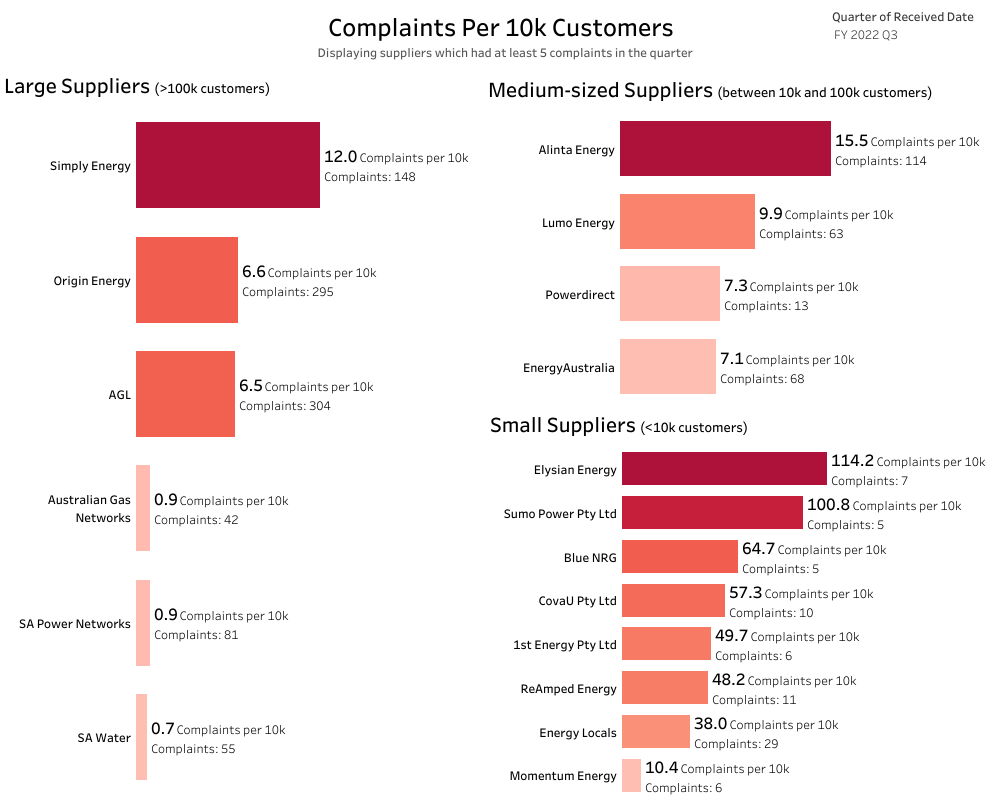
The number of complaints per 10,000 customers for each supplier is calculated by dividing the number of complaints received during the quarter by the total number of customers for each supplier, multiplied by 10,000. Large Suppliers are those with over 100,000 customers, Medium-sized Suppliers have between 10,000 and 100,000 customers, Small Suppliers have between 1,000 and 10,000 customers and Very Small Suppliers have less than 1,000 customers. The total number of complaints is also presented for context.
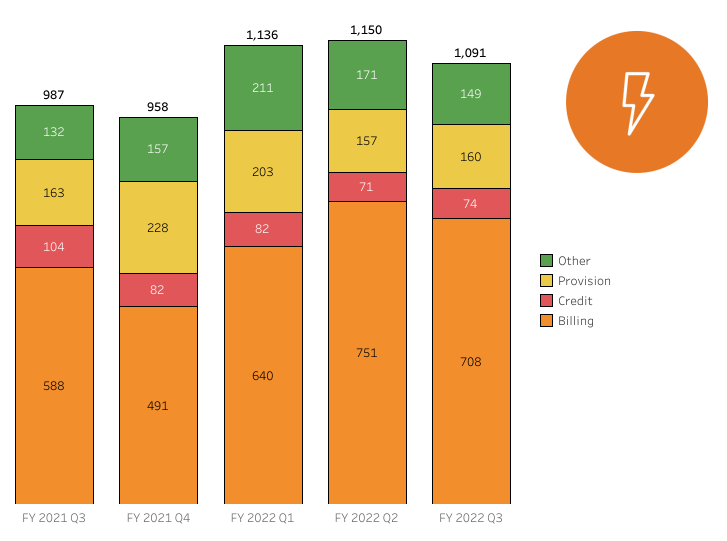
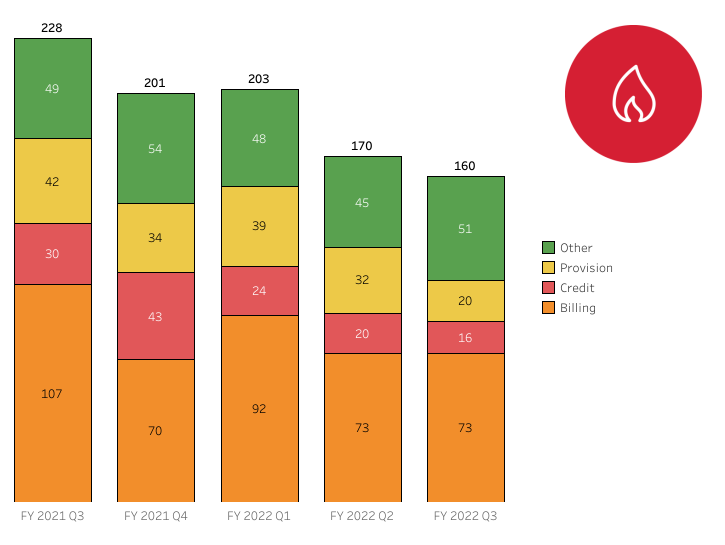
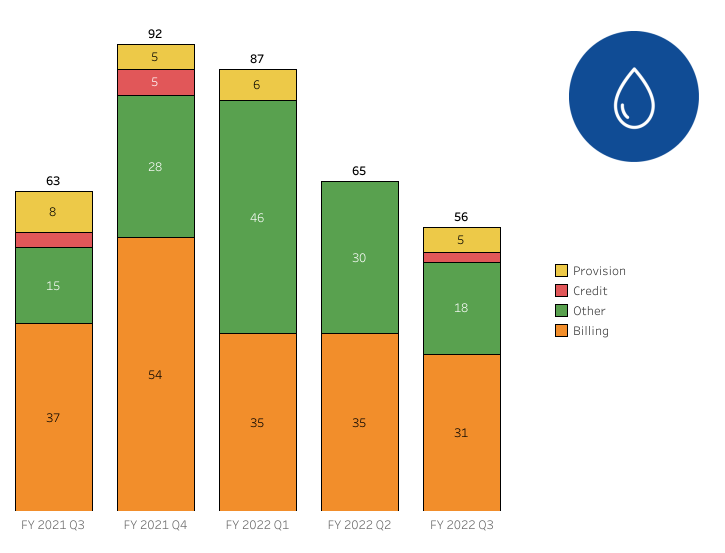
Remember, we are here to help
EWOSA facilitates the prompt resolution of complaints and disputes between consumers of electricity, gas and water services and Members of the Scheme by providing a service to consumers which is free, independent, accessible, fair and informal.
Freecall 1800 665 565
SMS 0488 854 555